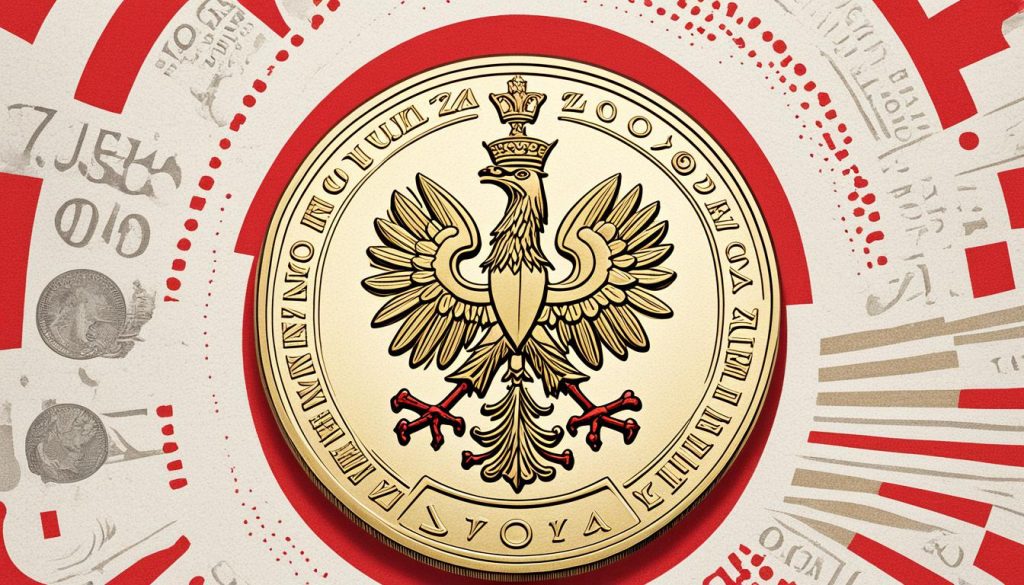The financial scene in Poland is critical to its economy. It changed greatly after communism ended. The National Bank of Poland became an independent entity. It handles the nation’s currency and oversees banks.
In moving to a market economy, Poland took bold steps. It allowed the złoty to be traded freely worldwide. It also adjusted the value of the złoty in 1995. Even as an EU member, Poland keeps using its own currency, a choice backed by the Law and Justice party.
The Warsaw Stock Exchange was started in 1991. This move, along with heavy foreign investments in the ’90s, shows Poland’s push for financial advancement.
Plus, Poland has strong trade relations, especially with Germany, China, and Italy. Its service sector’s growth has greatly boosted the GDP.
Key Takeaways
- The finance and banking sector is pivotal to Poland’s economic framework.
- The National Bank of Poland is responsible for currency regulation and banking sector oversight.
- Polan adopted a free-market system swiftly, including revaluing the złoty in 1995.
- Despite EU membership, political decisions maintain the national currency.
- The Warsaw Stock Exchange and substantial foreign investments showcase Poland’s commitment to financial development.
Historical Overview of Poland’s Financial Sector
Poland’s financial sector has undergone major changes, notably after the communist era. These shifts played a key role in creating the economic scene we see today. They show how government control and free markets mixed together.
Communist Era and State Ownership
In the communist times, the government owned and ran Poland’s finances. The National Bank of Poland had all the power. It handled everything from money policy to state companies.
This was how things were until the late 1980s. Then, significant changes started happening.
Post-Communist Reforms
By the late 1980s and early 1990s, Poland was moving towards a market-driven economy. This shift involved big changes, known as the banking reforms after communism. One major step was selling government businesses to private owners.
Another was making the National Bank its own authority. A new currency in 1995 also helped these changes. Thanks to these reforms, more foreign investment flowed into Poland. This showed Poland’s growth and how its economic story is full of changes.
Regulation and Supervision of Banks in Poland

Poland’s banking sector is under strict control to keep it stable and honest. The Polish Financial Supervision Authority (KNF) and the National Bank of Poland (NBP) are key. They help keep the banking system strong.
Polish Financial Supervision Authority (KNF)
The KNF plays a critical part in Poland’s financial rules. It looks after market players and pushes for fair behaviour. It also encourages learning about finance. By making things clear and keeping clients safe, the KNF gains people’s trust.
Role of the National Bank of Poland (NBP)
Meanwhile, the NBP is central to making monetary policy, creating money, and overseeing Polish banks. It’s a foundational piece of Poland’s financial scene. It stabilises the economy with careful oversight. The NBP’s role in regulation and keeping banks stable is vital for economic growth.
Types of Banks in Poland

Poland has a varied banking system that meets different needs and demands.
Commercial Banks
Commercial banks in Poland are crucial. They provide a wide array of services. These include simple deposit accounts and loans as well as advanced options for businesses.
Cooperative Banks
Cooperative banks focus on local communities. They are member-based and offer tailored financial help. This approach helps with mutual support and grows the local economy.
Investment Banks
Investment banks in Poland deal with specific financial services. They help with big transactions like underwriting and mergers. They are important for large investments and economic growth.
Digital Banks
Digital banks are becoming more popular in Poland. They provide easy, tech-savvy banking options. Their focus is on convenience and efficiency for today’s customers.
The Role of Cooperative Banking

Cooperative banks in Poland are key to community banking, offering services that boost local growth and keep members happy. They’re owned by their members, showing the power of working together. These banks create financial products that meet their members’ needs.
They provide loans, savings accounts, and insurance, all aimed at helping people and boosting the local economy. By meeting the community’s unique needs, they make sure money is used well and fairly.
At their core, cooperative banks are about being open and including everyone. These banks are central to making the economy strong and promoting smart money habits in the community.
Besides, cooperative banks in Poland are run democratically, meaning all members get a say in decisions. This makes things more open and builds trust. This approach strengthens the connection between the bank and its members, and it shows their dedication to local growth.
Finance and Banking in Poland

The finance and banking industry in Poland is a key part of the nation’s economy. It includes a wide range of financial services. This includes both local and international players, creating a dynamic environment for economic growth. The sector is well-regulated, leading to strong growth and many different services for people and companies.
There are many branches and ATMs across the country. This makes financial services easy to get to and use. The finance and banking sector is crucial for Poland’s economic advances. It’s always getting better to meet the changing needs of a growing economy.
Importance of the National Bank of Poland

The National Bank of Poland (NBP) is vital for Poland’s economy’s health. It does more than just issue money. A key role is overseeing financial places to prevent economic troubles.
NBP has a big say in monetary matters, like setting interest rates and keeping inflation in check. These actions help keep Poland’s economy stable. It also makes sure banks follow strict rules, earning people’s trust.
The NBP’s work in overseeing the economy is crucial. It watches over banks to keep financial stability. By managing foreign reserves and guiding the country’s economic policies, NBP shows what effective central banking is about.
The Polish Złoty: Currency and Exchange Rates

The Polish Złoty shows Poland’s economic strength and freedom. It’s key in the nation’s finance scene. The złoty’s role and its trading on global markets highlight Poland’s economic health and world financial engagement.
From the start, the złoty changed a lot, showing Poland’s economic shifts. The National Bank of Poland kept the złoty strong and reliable. Its ability to trade freely worldwide shows Poland’s willingness to fit into the wider European economy.
Global market shifts affect the złoty’s exchange rates. These changes present both hurdles and openings. They show how Poland interacts with world finances and point to its careful economic plans, like possibly using the euro later.
The Polish Złoty‘s steady management is crucial for keeping confidence locally and globally. Watching its exchange rates helps investors check on Poland’s financial health. The currency is more than just for trading; it’s also a point of national pride and shows how well Poland handles its economics.
Evolution of Poland’s Stock Exchange

The Warsaw Stock Exchange began in 1991, opening a new era for Polish capital markets. Its start marked Poland’s move towards a free market, making a place for money to change hands.
Establishment of the Warsaw Stock Exchange
Starting in April 1991, the Warsaw Stock Exchange became a key player in Poland’s economy. It began with trading only five stocks but quickly grew. This showed the dream of a vibrant, growing market.
Growth and Development
The Exchange saw a lot of growth over time. In 1998, it launched a market for derivatives, widening trading options. Its dedication to new ideas and clear rules has pulled in many companies. This, in turn, has built trust and interest among investors.
Now, the Warsaw Stock Exchange is vital to Poland’s economy. It helps the economy grow and draws investors from home and abroad. Poland’s commitment to a strong financial system and a lively market is clear from this journey.
Insurance Sector in Poland

The Polish insurance market plays a key role in the country’s economy. It provides many types of insurance to people. Powszechny Zakład Ubezpieczeń (PZU) is the biggest insurance firm in Poland.
PZU leads the way in offering wide-ranging insurance options. They cover both personal and business needs. This includes life, health, property, and accident insurance. PZU is well-known for protecting the financial health of many in Poland.
There are many other insurance companies in Poland besides PZU. They add variety and competition to the market. These firms tailor their policies to meet specific individual needs, ensuring valuable cover.
The insurance market in Poland keeps changing. It adapts to new customer needs and regulations. This flexibility keeps the sector strong and trustworthy. It’s a vital part of Poland’s financial services.
Bank Accounts in Poland

In Poland, bank accounts provide various options for individuals and companies. You can choose from basic accounts for daily use to ones made for students and businesses. This means managing your money is easier for everyone.
Common Types of Bank Accounts
Polish banks offer different types of accounts, such as:
- Current Accounts: Perfect for regular transactions, paying bills, and using online banking.
- Savings Accounts: Helps you save money and earns you interest.
- Student Accounts: Comes with benefits aimed at student needs.
- Business Accounts: Designed to help with company finances, like payroll.
- Pick the right bank account for you.
- Go to a bank branch or apply on its website.
- Show them your ID, address proof, and, for businesses, your company papers.
- Wait for your account to get approved.
- After approval, you can start using your account right away.
Opening a Bank Account
Starting a bank account in Poland is pretty simple. Here’s what you need to do:
This easy process lets you manage your money well with Polish banking services, for both personal and professional needs.
Impact of Foreign Direct Investment
Foreign direct investment (FDI) has changed Poland’s economic scene for the better. It’s put the country on a steady path to growth. We’ll explore how FDI has greatly helped Poland’s economy.
Trends and Statistics
In the past years, Poland has seen a rise in FDI. This means more foreign money has come into the country. Sectors like manufacturing, real estate, and finance have benefited a lot from this.
More multinational companies are now doing business in Poland. This has made Poland’s economy stronger on the world stage.
Contributions to Economic Growth
Investments from abroad have been key in modernising Poland’s economy. They have created more jobs and brought in new technologies and better infrastructure. FDI has also helped Poland trade more with other countries. This makes the economy stronger and more varied.
Role of Digitalisation in Banking
Poland’s banking sector is changing rapidly because of digitalisation. This shift is transforming how people access banking services. Now, Polish banks use technology to offer fast and easy services.
Rise of Digital Banks
New digital banks have popped up, serving those who prefer online services. They let people handle their banking without visiting a branch. Thanks to digital banks, users enjoy straightforward banking from anywhere.
Adoption of Non-Cash Transactions
More people are choosing not to use cash for transactions. They use cards or mobile wallets instead. This makes buying things quicker and safer. Poland is moving towards not using cash, which is part of a bigger change.
Digitalisation is changing how banks in Poland work. It combines digital banking, online services, and not using cash. This mix makes everyday banking smoother.
Challenges Facing the Polish Banking Sector
The Polish banking sector is up against big hurdles. It seeks stability and growth but hits roadblocks. Regulatory issues and fiscal pressures are the main barriers banks face.
Regulatory and Fiscal Burdens
Polish banks must follow strict rules. They wrestle with tough banking laws and constant oversight from the KNF. Alongside, bank taxes and fees add more challenges. Banks need smart money management to stay profitable and keep customers happy.
Interest Rates and Inflation
Interest rates and inflation also trouble the banking sector. Their unpredictable nature messes with financial plans. Banks have to keep adjusting. They do this to protect customers’ savings and keep making money from loans.
The Role of the Bank Guarantee Fund (BFG)
The Bank Guarantee Fund (BFG) keeps people’s money safe in Polish banks. It manages the deposit guarantee scheme Poland. This helps protect everyone who has money in the banks. Also, it ensures people remain confident in the banking system. The BFG also deals with financial institutions that are having problems.
Working with the National Bank of Poland (NBP) and the Polish Financial Supervision Authority (KNF), the BFG supports the safe operating of the financial sector. Their teamwork helps identify and handle financial risks properly. As a result, the banking system in Poland stays strong and stable.
The BFG’s efforts in maintaining banking security are critical. They prepare for and help prevent financial emergencies. By ensuring that deposits are safe up to a certain limit, the BFG helps protect against the effects of bank failures. This action builds trust in the Polish banking sector. It also helps the country’s economy grow in a stable financial environment.
Poland’s Financial Services Industry
Poland’s financial services sector has seen huge growth and changes. It’s now full of both old and new types of financial services. This area is growing fast because of this.
Growth of Financial Services
The financial services in Poland have grown a lot. They now offer more products and use new technology. This growth meets the rising needs of companies and people. It makes banking and buying things easier.
Key Players in the Industry
Big banks and insurance companies are important in Poland’s financial sector. PKO Bank Polski, Bank Pekao, and Powszechny Zakład Ubezpieczeń are leading this charge. They help keep Poland’s economy strong by innovating and creating a solid financial base.
Taxation Policies Impacting Banking
Poland’s financial world deals with a lot of tax rules. Taxes like value-added tax (VAT) and a special banking tax are big deals. They really affect how banks do their business in the country.
Value-Added Tax (VAT)
The Poland VAT system was a big change. It took the place of an older tax. With VAT, the tax is added at each step of making and selling things. This changes how banks set their prices.
Banking Tax
Besides VAT, there’s a special tax just for banks. It’s based on how much the bank is worth. This tax makes things tough but it helps the country’s budget. Banks need to understand this to keep running well in Poland’s financial scene.
Future Prospects for Poland’s Banking Industry
The Polish banking sector is praised for being safe and innovative. It’s expected to grow significantly soon. The country is using modern methods and strong public support to improve. The banks’ focus is on digital technology to better serve their customers. Yet, they must also tackle tough challenges like rules and changing economies to keep improving.
Poland’s banks are getting ready for the future by using new technologies and financial ideas. Things like online banking and fintech are making banks more modern, easy, and friendly to use. Banks need to keep updating their services to match what customers want. This way, they can keep growing strong and steady.
Experts think Poland’s banking will get stronger with more investment in digital tech and better services. This smart planning will make the banking system stronger against future problems. For those involved in Poland’s banking, understanding and getting ready for these changes is key. It will help them ensure a strong and growing banking world for a long time.







